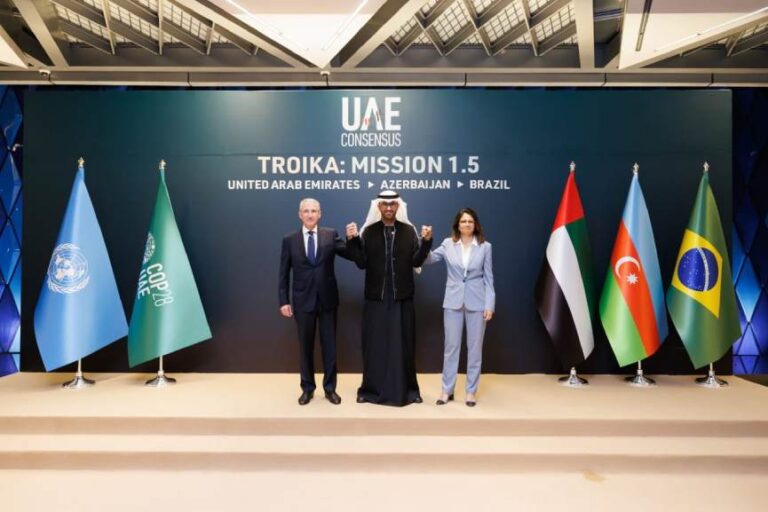COP28, the United Nations Climate Change Conference, has launched a partnership with Azerbaijan and Brazil, who will host COP29 and COP30, respectively, to improve cooperation and continuity between current and future COP Presidencies, leading to increased climate action in support of “Mission 1.5°C”.
The partnership, known as The COP Presidencies Troika, marks the first time that a current COP Presidency has been formally mandated to unite with two future presidencies to foster international cooperation to stimulate ambition.
Dr. Sultan bin Ahmed Al Jaber, Minister of Industry and Advanced Technology (MoIAT) and COP28 President, emphasized the importance of this partnership, expressed that, “The Troika represents critical and unprecedented collaboration to maintain momentum, lock in continuity and anchor implementation.”
The Troika, which means group of three, will help to ensure the delivery of the Presidencies’ collective responsibilities and support of global priorities, which in turn will transform agreement into action by government and non-government stakeholders.
An agreement for the three Presidencies to work together on a “Roadmap to Mission 1.5°C” was mandated by the UAE Consensus. Supported by all 198 Parties, this agreement must now be actioned under the COP Presidencies Troika.
The agreement stated that the partnership will “significantly enhance international cooperation and the international enabling environment to stimulate ambition in the next round of nationally determined contributions, with a view to enhancing action and implementation over this critical decade and keeping 1.5°C within reach.”
Dr. Al Jaber added that, “The UAE Consensus included a clear mandate for the three Presidencies, the UAE, Azerbaijan and Brazil, to cooperate on the ‘Roadmap to Mission 1.5°C’. We will be working together through the COP Presidencies Troika, with our friends in Baku and Brazil, to ensure that promises made in Dubai are fulfilled through closer, focused partnerships and credible support to enable delivery. Together, we ensure that new agreements forged at the next COP set us on the path we need to achieve our mission.”
COP29, in Baku, Azerbaijan, is expected to agree on a New Collective Quantified Goal (NCQG) on climate finance to respond to the needs and priorities of developing countries. The adoption of the NCQG will constitute the most significant climate finance milestone since the 2009 commitment by developed countries to a goal of mobilizing jointly $100 billion a year by 2020 to address the needs of developing countries.
Building on both the UAE Consensus and the outcomes of Baku at COP30 in Brazil, the Troika’s laser focus on the 2025 Nationally Determined Contributions (NDCs) round will ensure that countries’ individual commitments deliver ambitious climate action. This will accelerate the global collective ability to meet the Paris goals in the context of sustainable development and efforts to eradicate poverty.
COP29 President-Designate Mukhtar Babayev, Azerbaijan’s Minister for Ecology and Natural Resources, joined Dr. Al Jaber and highlighted that, “We are committed to leveraging our strength as a bridge builder between the developed and developing world as host of COP29 to accelerate efforts to keep 1.5 in reach. Key to that will be establishing a new climate finance goal that reflects the scale and urgency of the climate challenge. And equally important, unlocking those funds and getting them to the nations that need them most.”
Minister Marina Silva, Brazil’s Minister of the Environment and Climate Change, commented that, “As I said in Dubai, we need to make the most of the opportunity that this Troika of COP Presidencies presents: to ensure that in these coming two years we will be able to do what science tells us we have to, in the last window of opportunity to achieve the 1.5°C ambition.”
Simon Stiell, the UN Climate Change Executive Secretary, stated that, “The unity of this Troika will help deliver on the ambition needed to tackle climate change through collaboration, cooperation and coordination. This is an opportunity to cement what was agreed at COP28, ensure that it is enabled by COP29 and the subsequent actions taken at COP30 with new ambitious NDCs, shifting finance from trickles to torrents and delivering 1.5°C aligned NDCs.”



